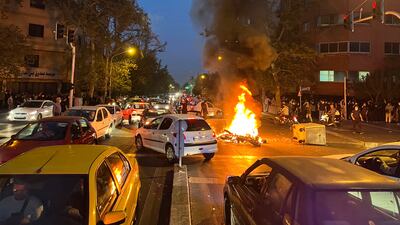At least 76 people have been killed in anti-regime protests in Iran over the death of Iranian-Kurdish woman Mahsa Amini, 22, after her arrest by so-called morality police, a rights group has said.
The violence drew strong condemnation from the UN on Tuesday.
Ravina Shamdasani, spokeswoman for the UN High Commissioner for Human Rights, said in Geneva that the office was “very concerned by the continued violent response by security forces”. She urged the authorities to restore internet access and release those who had been detained.
Iran is stepping up arrests of protesters and journalists in a clampdown on the unrest, activists have said. Iranian riot police and security forces clashed with demonstrators in dozens of cities on Tuesday, state media and social media reported.
Iranian authorities' official death toll remained at 41, which included several members of the security forces.
Officials said on Monday they had arrested more than 1,200 people.
Ms Shamdasani said there was no reason for security forces to use live ammunition to disperse protesters.
“We are extremely concerned by comments by some leaders vilifying protesters and by the apparent unnecessary and disproportionate use of force against protesters. Firearms must never be used simply to disperse an assembly,” she said.
Amini was pronounced dead on September 16 after three days in a coma following her arrest by “morality police” in the Iranian capital for wearing the headscarf in an “improper” way.
Protesters took to the streets in the capital Tehran and elsewhere on Monday for the eleventh straight night of demonstrations, witnesses told AFP.
Tehran crowds shouted “death to the dictator”, calling for the end of the more than three-decade rule of supreme leader Ayatollah Ali Khamenei, 83.
Video footage shot from several floors above street level, purportedly in the north-western city of Tabriz, showed people protesting to the sound of tear gas canisters being fired by security forces. The footage was published by the Oslo-based group Iran Human Rights.
The group said at least 76 people had been killed in the unrest, up from a previous count of 57.
Video footage and death certificates obtained by IHR showed that “live ammunition is being directly fired at protesters”, it said.
Twenty journalists have been jailed since the protests began, the Washington-based Committee to Protect Journalists said.
Numerous activists and lawyers have also been held, including the prominent freedom of speech campaigner, Hossein Ronaghi, who was arrested at the weekend.
The arrests come on top of severe internet restrictions and the blocking of sites including Instagram and WhatsApp, which activists say is aimed at preventing details of the protests reaching the outside world.
“By targeting journalists amid a great deal of violence after restricting access to WhatsApp and Instagram, the Iranian authorities are sending a clear message that there must be no coverage of the protests,” Reporters Without Borders said.
Mr Ronaghi, a critic of Iran's leadership, said in a video posted at the weekend that he had initially avoided arrest by escaping his flat when agents came for him.
But he was then detained on Saturday when he went to Tehran's Evin Prison to meet prosecutors and was also beaten by security agents, his brother Hassan wrote on Twitter.
His mother told Manoto TV that Mr Ronaghi's leg was broken.
Reports said that his lawyers, who accompanied him to Evin, had also been detained.
Two other lawyers have also been arrested, lawyer Saeid Dehghan wrote on Twitter.
“This means defending protesters is prohibited,” he said.
Clerics divided
The Iranian judiciary chief, Gholamhossein Mohseni Ejei, has stressed "the need for decisive action without leniency" against the protest instigators.
But a powerful Shiite cleric long aligned with the country's ultra-conservative establishment has urged authorities to take a softer line.
"The leaders must listen to the demands of the people, resolve their problems and show sensitivity to their rights," said Grand Ayatollah Hossein Nouri Hamedani.
In addition to the UN's condemnation, the bloody crackdown has drawn stern remarks from Western governments, clouding diplomatic efforts to revive a nuclear deal between Iran and major powers that was abandoned by then US president Donald Trump in 2018.
The EU's foreign policy chief Josep Borrell, who has led those efforts, on Sunday slammed Iran for its "widespread and disproportionate use of force against nonviolent protesters".
The United States last week imposed sanctions against the Iranian morality police, and Canadian Prime Minister Justin Trudeau said on Monday that his own country would follow suit as part of a sanctions package "on dozens of individuals and entities".







































































